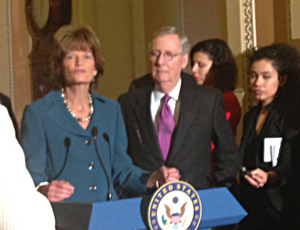
The Senate has approved legislation authorizing construction to begin on the controversial and long-delayed $3.3-billion Keystone XL oil-pipeline project. The Senate passed the bill on Jan. 29 by a 62-36 vote.
But the uncertainty hanging over the final leg of the pipeline continues. The project, proposed by Calgary-based TransCanada Corp., would run from Alberta's tar-sands region to Nebraska. It has been in limbo for more than three years, awaiting President Obama's approval.
Obama says he will veto the bill if it reaches his desk. White House spokesmen in recent weeks have repeatedly said the president wants to go through the established process for determining whether a major international pipeline project is in the national interest.
The House passed a measure on Jan. 9 that authorized the project.
Shortly after a Senate cloture vote on Jan. 29, GOP leaders there were unsure about the bill’s next steps after the Senate's expected passage. The measure could go to a conference committee to reconcile the differences between the bill's House and Senate versions, or the Senate-passed bill could go to the House for another vote.
“We’re already starting to talk about whether we need to conference with the House,” Sen. John Hoeven (R-N.D.), one of the bill’s chief sponsors, told reporters.
The Senate approved several amendments to the bill. They include a stripped-down version of an energy efficiency bill, sponsored by Jeanne Shaheen (D-N.H.) and Rob Portman (R-Ohio), that failed to pass the Senate last year. The amendment, sponsored by Portman, includes modest energy-efficiency reforms that architectural, engineering and construction firms generally support. It was approved on a 94-5 vote.
If the president does veto the Keystone bill, Hoeven said, the pipeline's supporters “would most likely attach the bill to another energy vehicle” in coming weeks.
However, Senate Energy and Natural Resources Committee Chair Lisa Murkowski (R-Alaska), a key player in shepherding the bill through the Senate, was unwilling to speculate about what vehicle that might be.
Reaction to the bill’s passage was polarized. Organized-labor and construction-industry groups, which say the project would create thousands of construction jobs, praised the Senate for passing the bill.
Laborers’ International Union of North America General President Terry O’Sullivan said in a statement, “We hope the president stops the politics when a bill reaches his desk and unlocks the good jobs and energy the pipeline will support.”
A spokesman for North America’s Building Trades Unions released a statement, saying, "Considering that the U.S. construction industry continues to labor under a national unemployment rate in excess of 8%, we are grateful that a strong bipartisan majority of 62 senators recognized this issue as a jobs bill and voted to put an end to a ridiculously protracted review process, one that has now taken far longer than any other cross-border pipeline project in history.”
But the bill’s opponents, who include environmental and public-health advocates as well as many Democrats, contend the project would lock in the infrastructure for a fossil fuel that would contribute to greenhouse-gas emissions and provide little benefit to most Americans.
Sen. Barbara Boxer (Calif.), the Environment and Public Works Committee's top Democrat, said the bill “waives every right of the American people to have our environmental laws apply to this project.”
Sen. Charles Schumer (D-N.Y.) said Senate Democrats had tried to add amendments that would have made the bill more palatable to their party, including a provision to require U.S.-manufactured steel on the project, but GOP leaders rejected those proposals.


Post a comment to this article
Report Abusive Comment